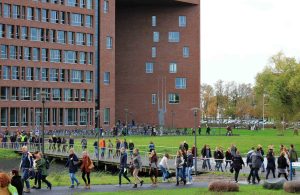From A-Z: Studying at WUR (pt. 2)
Welcome to pt. 2 of this blog post series – a list of alphabetical terms to help you find your way through the WUR jungle! Don’t forget to check blog pt. 1 (if you haven’t yet)!
Networking
Networking is an important part of student life here at WUR. Whether in classes during group work, in study associations (see Vereniging below), or in the Sports Centre de Bongerd, you are bound to meet plenty of interesting people to socialise with.
Osiris
Osiris is a portal where you can manage your student information, course and exam enrolment, and study progress. Here, you can also access the Study Handbook that provides you with official information about courses.
Periods
There are three periods per semester – two eight-week periods and one four-week period. In the former, there are six weeks of lectures, one study week without any lectures and an exam week. Students usually follow two courses during an eight-week period. In a four-week period you follow only one course instead of two, and the examination takes place in the final week. There is no study week in a four-week period.
Questions
Is this the right programme for me? Which specialisation should I choose? What is living in Wageningen like?
I remember very well the endless stream of questions before I arrived at WUR. Luckily, there are many ways to get your questions answered, such as joining a Virtual Open Day, attending live Q&A sessions on our Instagram profile, subscribing to the WUR newsletter to stay up to date, and other study orientation options.
Resit weeks
No need to worry if you don’t pass your exam on the first attempt. You can give it another try during one of the three Resit weeks! These are scheduled in February, May and July. Just make sure that you enrol for the appropriate resit period.
Scholarships
To help out prospective international master’s students, Wageningen University offers several possibilities for scholarships. These depend on your country of origin and residence permit in the Netherlands.
Tutorials
Next to the usual lectures, WUR also offers practical sessions, lab work and tutorials, depending on your field of study. Here you get to apply your knowledge and gain practical skills. Tutorials and practicals are often compulsory, so make sure you don’t miss them!
Understanding
Moving to a different country can be challenging. To help you understand the Dutch culture, WUR organises the Annual Introduction Days (AID). This is where you will get to know your fellow students, experience what the student life has to offer and explore the campus and the town of Wageningen. To improve your Dutch language, you can follow a course at WUR’s language centre in’to Languages. Make sure to sign up quickly though, the places are limited!
Vereniging
There are Three types of Vereniging (Dutch word for ‘association’): Studieverenigingen (Study Associations), Studentenverenigingen (Student Associations) and Studentensportverenigingen (Student Sport Associations).
The aim of Study Associations is to support the students of their related study programs. This is where you can meet your peers, as well as attend various events, for example excursions. A membership can also often get you a discount on your study books.
Student Associations are mainly focused on free time activities and socialising. They organise parties, pub quizzes, dinners and more!
Student Sport Associations are organised around a specific sport. They offer a place to train together, attend competitions and of course enjoy other free time activities as well.
Workshops, Seminars and Conferences
WUR is a very busy place with various workshops, seminars, conferences and symposia being organised weekly. These are a great opportunity to dive into various topics as well as meet new people.
eXchange
Apologies for cheating a little, but I thought that it would be nice to mention the possibility to study abroad during your studies. This could be for a study exchange, an internship or for your thesis. You might even be eligible for a grant!
You!
WUR is one of the smaller universities in the Netherlands, and Wageningen is a small town. This means that you will form close relationships with the people around you. The lecturers and professors will likely know you by your name and their approach will be personal. After all, you will meet many of them outside of the lecture halls – for example at the weekly market in the city centre. Therefore, you, as an individual, are an important part of the community!
Zelfstudie
Zelfstudie (Dutch word for ‘self-study’) is an important aspect of your studies here at WUR. It provides you with the opportunity to catch up with the compulsory readings, work on your assignments or finish your group-work project. Be aware that this is not always scheduled in the timetable. So if your morning appears free, double check with your course coordinator before booking a different activity.




My name is Etinala Tembo from Zambia. I have the information shared byLaura Sanchez very interesting and thank you for sharing
Hello Etinala,
thank you for your comment. We are glad you found the information useful.
Kind regards,
Margaréta